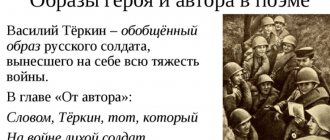The story of the Russian sailor Vasily Koriotsky and the beautiful princess Irakli of the Florensky land
Vasily Koriotsky, the son of an impoverished Russian nobleman, asks his father for his blessing to let him go into service, and then he will be able to send his parents money from his salary. In St. Petersburg, a young man signs up on a ship as a simple sailor. For his honesty, diligence and intelligence, Vasily is appointed senior on the ship, and when a decree is issued to select the best sailors and send them to study in Europe, Vasily is sent to Holland and assigned to the house of a rich merchant. He becomes attached to the young man and trusts him more than his clerks. Vasily, on his instructions, travels with goods to England and France and successfully conducts trade.
Continued after advertisement:
The merchant generously rewards the young man, and he sends his father a large sum of money through a promissory note. When Vasily’s stay in Holland ends, the merchant asks him to stay with him forever, for he fell in love with the young man as if he were his own son. But Vasily asks to let him go to his father and promises to return back. The merchant gives him three ships with goods and a lot of money and lets him go. In case of emergency, Vasily sews a thousand ducats into the wedges of his caftan and sails to Russia.
A storm rises at sea, and the ship on which the young man is sailing sinks. Vasily, clinging to the board, is nailed to a large island where robbers live. The young man is also called a robber, and they accept him as a comrade. When robbers go to rob merchant ships that sail past the island, Vasily always asks them to let him go fishing alone. Not wanting to commit robbery, the young man walks along the shore, then brings some of the money that was sewn into his caftan, and tells the robbers that he attacked a small ship and took everything that the shipmen had. So he brings either one hundred or two hundred chervonets.
Briefly exists thanks to advertising:
The robbers like such a daring fellow, and they decide to appoint him as their chieftain instead of the previous one. The young man refuses, but they threaten to kill him, and Vasily has to agree. The former chieftain gives him their entire treasury and the keys to the closet, which he is forbidden to enter, because the robbers, on pain of death, make him promise never to open it without them. When the captain reports that merchant ships have appeared at sea, Vasily, before releasing the robbers to fish, pretends that he knows a lot about magic and charms their weapons, and just before the battle he gives everyone a glass of wine.
One day Vasily, left alone, unlocks the closet and sees a beautiful maiden in it. She tells him that she is Heraclius, the daughter of the King of Florence: she was captured by robbers and kept locked up, because they cannot agree on which of them should own her. The girl begs Vasily to save her, and he promises to help her. One day he meets fishermen from the Caesar State (Austria) on the island, who bring fish for sale to the robbers, and negotiates with them to take him out of the island. Having waited for a convenient time, Vasily announces to the robbers that he saw seven merchant ships at sea and orders them to be captured.
Continued after advertisement:
When all the robbers go fishing, he takes all the gold they looted and, together with Iraklia, sails off the island in a fishing boat. The robbers, having discovered the loss of the treasury and the ataman, try to catch up with them, but the fugitives manage to escape. Vasily and Iraklia reach the pier and sail on a mail ship to Caesarea, where Vasily rents a large beautiful house and lives in it with Iraklia in great luxury.
The Tsar meets Vasily in expensive decorations in the church and asks him who he is and where he comes from. He tells the Caesar about his adventures and how he saved the daughter of the King of Florence from robbers. The Tsar takes a liking to the brave Russian sailor, he brings Vasily closer to him, calls him nothing less than brother and invites him and Irakli to settle in his palace. The Caesar tells Vasily that Irakli's father ordered his admiral to find his daughter and promised that if he fulfills his order, he will give Irakli to him as his wife, although the admiral is no longer young. After some time, the ships of the Florensky admiral sail to Caesarea. The Caesar announces to him that Heraclius lives in his palace with his brother, Vasily, who is free to do as he wishes: give it to Admiral Heraclius or not. When Vasily tells Iraklia about the admiral’s arrival, she is sad and puts on a black dress. The admiral asks Irakli to return home with him, but she replies that this is not her will, but Vasily’s, who saved her from the robbers. Vasily tells the admiral that he will not let Iraklia go with him, let the admiral return to the king and tell him that his daughter is safely in Caesarea, and the king will receive her only if he personally comes for her.
The admiral decides to take away the royal daughter by deception and invites Vasily and Heraclius onto his ship, along with the crown generals, ministers and drabants (bodyguards). He generously treats them with wine, and then orders his officers to throw everyone off the ship except Heraclius. The admiral orders Vasily to be drowned, but the officers take pity on him, secretly put him in a boat and release him. The admiral sails to the Florentine state, and demands from Iraklia, on pain of death, that she declare to her father that the admiral took her in battle in Caesarea.
Briefly exists thanks to advertising:
Arriving at his homeland, the admiral demands from the king what he promised, and he agrees to give his daughter to him as his wife. Iraklia mourns and does not take off her black dress, even when she is taken to church to marry the admiral. And Vasily, who managed to get to the Florensky land before the admiral, finds out on what day Irakli will be married. When she rides in a carriage past the shack where Vasily settled, he takes a harp and sings a pitiful song in which he reminds Heraclius of how he saved her from robbers, and the treacherous admiral ordered him to be drowned. The princess sees Vasily, brings him to her parents and tells them the whole truth.
Outraged by the admiral's treachery and meanness, the king orders his execution, and gives his daughter to Vasily as his wife. Some time after the wedding, Vasily visits the Tsar, who rejoices at his brother’s happiness. The young live in glory and contentment, and after the death of the king, Basil becomes king of Florence and reigns until his death.
Tales of Peter's time. "The story of the Russian sailor Vasily Koriotsky."
Retelling:
Vasily Koriotsky, the son of an impoverished Russian nobleman, asks his father for his blessing to let him go into service, and then he will be able to send his parents money from his salary. In St. Petersburg, a young man signs up on a ship as a simple sailor. For his honesty, diligence and intelligence, Vasily is appointed senior on the ship, and when a decree is issued to select the best sailors and send them to study in Europe, Vasily is sent to Holland and assigned to the house of a rich merchant. He becomes attached to the young man and trusts him more than his clerks. Vasily, on his instructions, travels with goods to England and France and successfully conducts trade.
The merchant generously rewards the young man, and he sends his father a large sum of money through a promissory note. When Vasily’s stay in Holland ends, the merchant asks him to stay with him forever, for he fell in love with the young man as if he were his own son. But Vasily asks to let him go to his father and promises to return back. The merchant gives him three ships with goods and a lot of money and lets him go. In case of emergency, Vasily sews a thousand ducats into the wedges of his caftan and sails to Russia.
A storm rises at sea, and the ship on which the young man is sailing sinks. Vasily, clinging to the board, is nailed to a large island where robbers live. The young man is also called a robber, and they accept him as a comrade. When robbers go to rob merchant ships that sail past the island, Vasily always asks them to let him go fishing alone. Not wanting to commit robbery, the young man walks along the shore, then brings some of the money that was sewn into his caftan, and tells the robbers that he attacked a small ship and took everything that the shipmen had. So he brings either one hundred or two hundred chervonets.
The robbers like such a daring fellow, and they decide to appoint him as their chieftain instead of the previous one. The young man refuses, but they threaten to kill him, and Vasily has to agree. The former chieftain gives him their entire treasury and the keys to the closet, which he is forbidden to enter, because the robbers, on pain of death, make him promise never to open it without them. When the captain reports that merchant ships have appeared at sea, Vasily, before releasing the robbers to fish, pretends that he knows a lot about magic and charms their weapons, and just before the battle he gives everyone a glass of wine.
One day Vasily, left alone, unlocks the closet and sees a beautiful maiden in it. She tells him that she is Heraclius, the daughter of the King of Florence: she was captured by robbers and kept locked up, because they cannot agree on which of them should own her. The girl begs Vasily to save her, and he promises to help her. One day he meets fishermen from the Caesar State (Austria) on the island, who bring fish for sale to the robbers, and negotiates with them to take him out of the island. Having waited for a convenient time, Vasily announces to the robbers that he saw seven merchant ships at sea and orders them to be captured.
When all the robbers go fishing, he takes all the gold they looted and, together with Iraklia, sails off the island in a fishing boat. The robbers, having discovered the loss of the treasury and the ataman, try to catch up with them, but the fugitives manage to escape. Vasily and Iraklia reach the pier and sail on a mail ship to Caesarea, where Vasily rents a large beautiful house and lives in it with Iraklia in great luxury.
The Tsar meets Vasily in expensive decorations in the church and asks him who he is and where he comes from. He tells the Caesar about his adventures and how he saved the daughter of the King of Florence from robbers. The Tsar takes a liking to the brave Russian sailor, he brings Vasily closer to him, calls him nothing less than brother and invites him and Irakli to settle in his palace. The Caesar tells Vasily that Irakli's father ordered his admiral to find his daughter and promised that if he fulfills his order, he will give Irakli to him as his wife, although the admiral is no longer young. After some time, the ships of the Florensky admiral sail to Caesarea. The Caesar announces to him that Heraclius lives in his palace with his brother, Vasily, who is free to do as he wishes: give it to Admiral Heraclius or not. When Vasily tells Iraklia about the admiral’s arrival, she is sad and puts on a black dress. The admiral asks Irakli to return home with him, but she replies that this is not her will, but Vasily’s, who saved her from the robbers. Vasily tells the admiral that he will not let Iraklia go with him, let the admiral return to the king and tell him that his daughter is safely in Caesarea, and the king will receive her only if he personally comes for her.
Attention!
If you need help writing a paper, we recommend turning to professionals. More than 70,000 authors are ready to help you right now. Free adjustments and improvements. Find out the cost of your work.
Cost calculationGuaranteesReviews
The admiral decides to take away the royal daughter by deception and invites Vasily and Heraclius onto his ship, along with the crown generals, ministers and drabants (bodyguards). He generously treats them with wine, and then orders his officers to throw everyone off the ship except Heraclius. The admiral orders Vasily to be drowned, but the officers take pity on him, secretly put him in a boat and release him. The admiral sails to the Florentine state, and, under pain of death, demands from Irakliya that she declare to her father that the admiral took her in battle in Caesarea.
Arriving at his homeland, the admiral demands from the king what he promised, and he agrees to give his daughter to him as his wife. Iraklia mourns and does not take off her black dress, even when she is taken to church to marry the admiral. And Vasily, who managed to get to the Florensky land before the admiral, finds out on what day Irakli will be married. When she rides in a carriage past the shack where Vasily settled, he takes a harp and sings a pitiful song in which he reminds Heraclius of how he saved her from robbers, and the treacherous admiral ordered him to be drowned. The princess sees Vasily, brings him to her parents and tells them the whole truth.
Outraged by the admiral's treachery and meanness, the king orders his execution, and gives his daughter to Vasily as his wife. Some time after the wedding, Vasily visits the Tsar, who rejoices at his brother’s happiness. The young live in glory and contentment, and after the death of the king, Basil becomes king of Florence and reigns until his death.
ANALYSIS:
One of the most striking and revealing phenomena of the Peter the Great era can be considered
handwritten anonymous
stories of the first third of the 18th century - “The History of the Russian sailor Vasily Koriotsky”, “The History of Alexander, a Russian nobleman”, “The History of the Russian merchant John”, “The History of the noble son " For example, let’s consider the first of them, the most popular and vibrant.
The work is divided into two parts: on the one hand, an everyday story about the life of a young nobleman sent abroad by the government to receive an education, on the other, a love-adventurous story, in which one can find both echoes of fairy tales and “robber” songs, as well as motifs Western European story.
The first part of the “history” is replete with real-life details characteristic of the Peter the Great era: St. Petersburg, the fleet, sending young people to Holland to improve in the sciences, the very name of the Russian state “Russian Europe” and much more. The image of the main character combines in a complex way both traditional (piety, reverence for parents and elders, love with equals, care for the weak) and new features. The latter appear mainly in connection with the emergence of a love theme: Vasily Koriotsky has a completely different attitude towards a woman than the heroes of the stories of Ancient Rus'; in his attitude towards Heraclius he is portrayed as a courteous gentleman, a gallant knight, a courtly lover. Unlike everyday stories of the 17th century, which are based on the archetypal motif of the “prodigal son,” Vasily does not conflict with parental authority. The view of love also turns out to be new - it is no longer an obsession, not the machinations of the devil, but a real and simple human feeling.
The main pattern of organization of the plot narrative in “History” is the principle of stepwise and contrasting development
. An unknown nobleman living in “great poverty” first becomes a sailor in the Russian fleet, where he attracts attention with his “sharpness of mind” and successes in “navigational science”, then - already in Holland - he not only studies various sciences, but actually becomes a partner “Galan guest”, sailing his ships across the seas and carrying out large and successful trade operations. This growth is stopped by a storm and a shipwreck: Vasily almost dies at sea on the way to his homeland. Finding himself on the robber island, Vasily also experiences some growth, ultimately becoming - against his will, but still - the chieftain of the robbers. Fleeing with Heraclius again jeopardizes his relative well-being, but pretty soon Vasily enters as an equal into the circle of European monarchs: the Tsar (Emperor of Austria) treats the Russian sailor with great respect and invites him to become a “sworn brother.” But this prosperity does not last long. The treachery of his rival, the Florentine admiral, almost destroyed the hero, but he escaped death, was brought by an oncoming fisherman to Florence and became a simple worker for some old woman in an almshouse. In the denouement of the story, Vasily again becomes the groom of Princess Heraclius, finally marries her, and the end of the story surrounds him with a real apotheosis: “Basily lived in great glory and after the king of Florence was the king of Florence; and lived for many years with the beautiful queen Irakliya and then died.”
It is noted that all the images of the story are introduced only with the aim of revealing certain traits in the character of the main character
.
Thanks to the hero's father, John of Coriot, we see Vasily as a loving, virtuous and caring son. The technique of antithesis
is also used : the stupidity of the robbers sets off the intelligence and cunning of Vasily, against the background of the admiral’s deceit and deceit, the directness and honesty of the Russian sailor stands out more clearly. And even Irakli is an image of little independence, needed by the author primarily to present Vasily as a gallant gentleman, far from alien to the power of feelings.
“History” is notable for its combination of the traditions of the Russian everyday story of the 17th century, Novgorod epics about the “rich guest” and the love-adventure novel characteristic of the European Baroque. In a similar way, it combines Slavicisms with foreign language borrowings from the Peter the Great era, features of traditional patriarchal morality with emerging individualism. The work retained its handwritten character and anonymity from ancient Russian literature, but took an adventurous plot from Europe. One of the most important factors in the literature of the Peter the Great era was the development of a new concept of personality, the solution of human problems. Now man was perceived not as a source of sinfulness, but as an independent active personality, valuable in itself and for service to the fatherland. Now only thanks to your intelligence, courage, and ingenuity could you rise from the lower strata of society to the highest.
We will help you write any paper on a similar topic.
- Essay
Tales of Peter's time. "The story of the Russian sailor Vasily Koriotsky."
From 250 rub.
- Test
Tales of Peter's time. "The story of the Russian sailor Vasily Koriotsky."
From 250 rub.
- Course work
Tales of Peter's time. "The story of the Russian sailor Vasily Koriotsky."
From 700 rub.
Receive completed work or specialist advice on your educational project
Find out the cost



